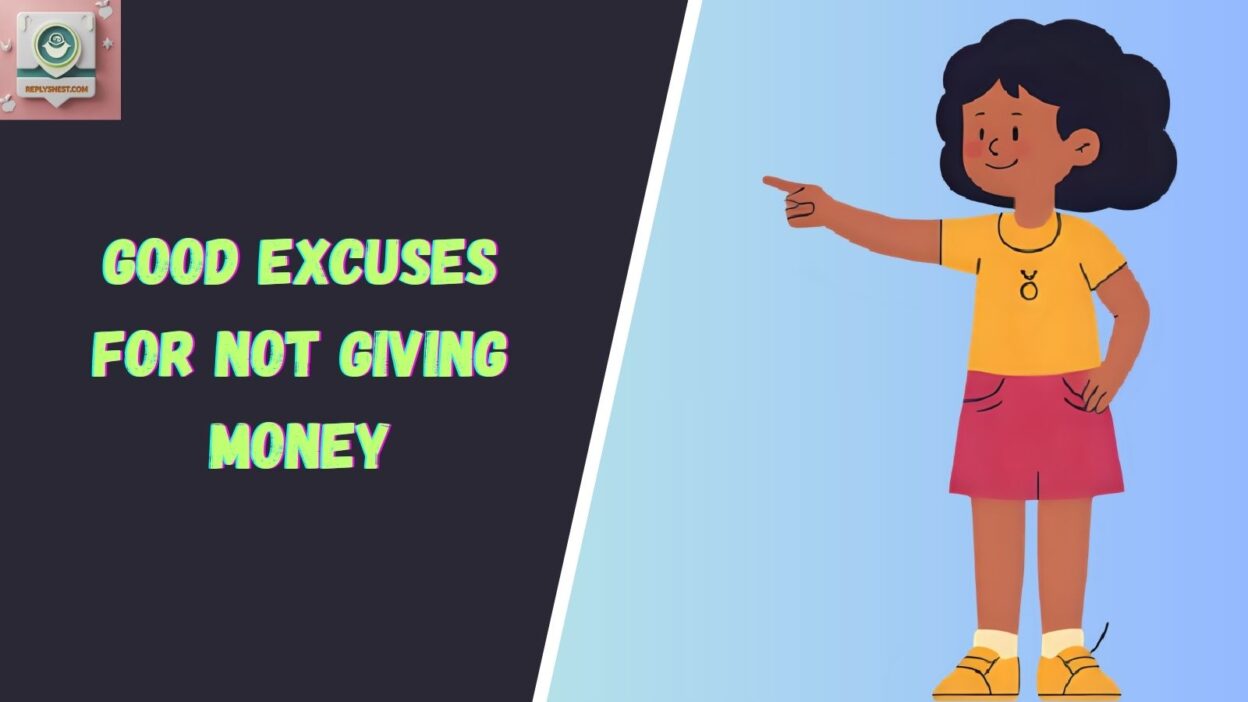Practical and Polite Ways to Decline
In the past, I’ve made a personal policy to avoid lending when it might be damaging to my financial stability. I might explain that I’m currently working with a set budget and can’t risk going over it, even for a buddy.
Other times, I try to keep things comfortable by using a softer approach. I might suggest alternative options like helping them find resources or brainstorm ways to meet their needs without cash. I wish I could help more, and I hope they know it’s not personal. But I’ve learned to avoid giving false hope, contradictory statements, or making promises for the future that I can’t keep.
I’ll sometimes add light humor mentioning that my bank account is on a diet, or that I’m waiting for the next payday before I can get anything extra. Whether it’s saying I’m down to my last dollar, still paying for medication, or joking about surviving on samples, the key is to be prepared, stay appropriate, and protect both your balance and your relationship.
When someone asks you for money, it can feel awkward to say no especially if you care about them. But the truth is, not everyone is in a position to help financially, and that’s okay. Having a list of good excuses for not giving money can help you express your boundaries with kindness, empathy, and respect. This way, you protect your financial health while still showing that you value the relationship.
Below, you’ll find 30 thoughtful excuses you can use, each explained with best use cases, when not to use them, alternative phrases, and examples. These responses are warm, considerate, and respectful, ensuring you can communicate effectively without guilt or discomfort.
1. “I’m on a Tight Budget Right Now”
Best use: When you genuinely have financial limits and need to prioritize essentials.
Not to use: If you’re visibly spending freely on luxuries around the person.
Other ways to say: “Things are tight this month” / “I have to be careful with expenses.”
Example: “I’d love to help, but I’m on a tight budget right now.”
Read More: Other Ways to Say “Don’t Miss Me Too Much”
2. “I’m Saving for Something Important”
Best use: When you’re setting aside money for a personal goal (education, house, emergency fund).
Not to use: If your “goal” isn’t convincing (like buying the latest gadget).
Other ways to say: “I’m prioritizing my savings” / “I have some financial commitments.”
Example: “I can’t lend at the moment, I’m saving for an important expense.”
3. “I Don’t Lend Money, but I Can Help in Other Ways”
Best use: When you want to offer support without giving cash.
Not to use: If they urgently need financial assistance only.
Other ways to say: “I can’t lend, but I’m here in other ways.”
Example: “I don’t give out money, but I can help you brainstorm solutions.”
4. “I’m Paying Off Debts Myself”
Best use: When you’re handling loans, credit cards, or personal debt.
Not to use: If you’ve already bragged about being debt-free.
Other ways to say: “I’m still catching up financially” / “I have repayments to make.”
Example: “I’m focused on clearing my debts, so I can’t lend right now.”
5. “I’ve Had Unexpected Expenses”
Best use: When something comes up, car repair, medical bill, home issue.
Not to use: If you’re using it too often and it sounds like a pattern.
Other ways to say: “I had some surprise costs” / “I wasn’t prepared for recent expenses.”
Example: “I just had an unexpected expense, so I can’t spare any money.”
6. “I Have to Prioritize My Family’s Needs”
Best use: When you need to take care of your household first.
Not to use: If your family situation doesn’t require much financial attention.
Other ways to say: “My family comes first financially” / “I need to keep funds for home needs.”
Example: “I have to put my family’s needs first, so I can’t help this time.”
7. “I Don’t Mix Money with Relationships”
Best use: To avoid conflict in friendships or family ties.
Not to use: If you’ve lent to others recently.
Other ways to say: “I keep finances separate from personal relationships.”
Example: “I avoid mixing money with relationships; it helps me keep things smooth.”
8. “I’ve Committed My Finances Elsewhere”
Best use: When you’ve already allocated funds to obligations or donations.
Not to use: If you’re seen spending freely elsewhere.
Other ways to say: “My money is already tied up” / “I’ve budgeted it elsewhere.”
Example: “I’ve already committed my finances, so I can’t give money now.”
9. “I’m Working Toward Financial Stability”
Best use: When you’re building security, savings, or investments.
Not to use: If you’ve already portrayed yourself as financially stable.
Other ways to say: “I’m not there yet financially” / “I’m still stabilizing my money.”
Example: “I’m working on financial stability, so I can’t lend money right now.”
10. “I Don’t Want to Risk Straining Our Relationship”
Best use: When you value the relationship more than financial exchange.
Not to use: If you’ve already mixed money and friendship.
Other ways to say: “Money complicates things” / “I’d rather not add stress to our bond.”
Example: “I don’t want money to affect our friendship, so I’ll pass this time.”
11. “I’m Focused on My Emergency Fund”
Best use: When you’re building savings for future security.
Not to use: If you’re known for spending impulsively.
Other ways to say: “I’m setting aside for emergencies” / “I need a safety net.”
Example: “I’m focused on building my emergency fund right now.”
12. “I’m Not Comfortable Lending Money”
Best use: When you want to be direct and honest.
Not to use: If you want to avoid sounding blunt without explanation.
Other ways to say: “I don’t feel right about lending money” / “It’s not something I do.”
Example: “I’m not comfortable lending money, but I wish you the best.”
13. “I’m Living Paycheck to Paycheck”
Best use: When you really can’t spare extra funds.
Not to use: If your lifestyle suggests otherwise.
Other ways to say: “I barely cover my own costs” / “My income only covers essentials.”
Example: “I’m living paycheck to paycheck, so I can’t lend money right now.”
14. “I’m Saving for Retirement”
Best use: When preparing for long-term financial security.
Not to use: If you’re still very young and not saving yet.
Other ways to say: “I’m putting money aside for the future” / “I’m retirement-focused.”
Example: “I need to save for retirement, so I can’t lend right now.”
15. “I’ve Set Boundaries Around Money”
Best use: When you want to establish clear limits.
Not to use: If you’ve broken your own rule recently.
Other ways to say: “I don’t cross certain financial boundaries” / “It’s a personal rule.”
Example: “I’ve set boundaries around money, so I don’t lend it out.”
16. “I’m Planning for Future Expenses”
Best use: When you know upcoming obligations are coming (school fees, bills).
Not to use: If you don’t really have any future financial commitments.
Other ways to say: “I need to keep funds for upcoming needs” / “Future expenses are my focus.”
Example: “I have some big expenses coming up, so I can’t lend right now.”
17. “I’ve Already Helped Someone Recently”
Best use: When you’ve recently lent or given money elsewhere.
Not to use: If you haven’t supported anyone financially in a long time.
Other ways to say: “I’ve already helped someone” / “I gave recently, so I can’t again.”
Example: “I already helped someone out, so I’m not able to help again now.”
18. “I’m Keeping My Finances Private”
Best use: When you want to avoid financial discussions.
Not to use: If you’ve been openly discussing money before.
Other ways to say: “I prefer not to share financial details” / “My money’s personal.”
Example: “I keep my finances private, so I won’t be lending.”
19. “I Don’t Have Spare Cash Right Now”
Best use: When your disposable income is limited.
Not to use: If you’ve just made unnecessary purchases in front of them.
Other ways to say: “I can’t spare extra right now” / “I don’t have loose funds.”
Example: “I don’t have spare cash right now to lend.”
20. “I’ve Had to Cut Back on Spending”
Best use: When you’re reducing expenses intentionally.
Not to use: If you’re not visibly making cutbacks.
Other ways to say: “I’m minimizing my expenses” / “I’m tightening my belt.”
Example: “I’ve cut back on spending, so I can’t help financially.”
21. “I’m Prioritizing My Own Financial Goals”
Best use: When you’re working toward something personal.
Not to use: If you have no real goals in place.
Other ways to say: “I’m focused on personal finances” / “I’m sticking to my goals.”
Example: “I’m prioritizing my own financial goals, so I can’t lend right now.”
22. “I’ve Had Salary Delays”
Best use: When your income is unstable or delayed.
Not to use: If your pay is reliable and stable.
Other ways to say: “My income isn’t consistent” / “I’m waiting on salary.”
Example: “My salary is delayed, so I can’t help financially.”
23. “I’ve Put Myself on a Spending Freeze”
Best use: When you’re intentionally pausing extra expenses.
Not to use: If you’ve been spending freely on luxuries.
Other ways to say: “I’m doing a no-spend challenge” / “I’m freezing extra costs.”
Example: “I’m on a spending freeze, so I can’t lend money.”
24. “I’m Keeping My Money Liquid for Emergencies”
Best use: When you need cash flow available.
Not to use: If you don’t have any emergencies foreseeable.
Other ways to say: “I need my money accessible” / “I can’t tie up funds.”
Example: “I’m keeping my money liquid for emergencies, so I can’t help right now.”
25. “I’ve Made a Rule Not to Lend Money”
Best use: When you want to be firm and clear.
Not to use: If you’ve lent to others before.
Other ways to say: “It’s a rule I stick to” / “I don’t lend by principle.”
Example: “I have a rule not to lend money, it keeps things simple.”
Conclusion
Saying no to giving money doesn’t make you selfish it makes you responsible. The key is to do it with kindness, empathy, and honesty. Whether you use a gentle excuse like “I’m on a tight budget” or a firm one like “I’ve made a rule not to lend money,” the important part is protecting your financial well-being while keeping relationships intact.
Remember, setting boundaries with money is a form of self-care. People who value you will respect your decision, and those who don’t may reveal their true intentions. Either way, it’s important to communicate with warmth and clarity.
10 Editor’s Picks
- The Power of Saying No Without Guilt
- How to Set Financial Boundaries in Relationships
- 25 Polite Ways to Decline Borrow Requests
- Building an Emergency Fund: Why It Matters
- How to Balance Generosity and Responsibility
- What to Say When Friends Ask for Money
- Protecting Friendships from Money Conflicts
- Financial Self-Care: Putting Yourself First
- 20 Respectful Ways to Say No Without Offending
- Why It’s Okay to Put Your Finances First



